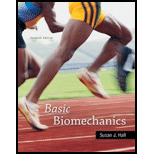
Concept explainers
To list: The three examples of activities requiring concentric muscle action and three examples of activities requiring eccentric muscle action and also identify the specific muscle and muscle groups that are involved in these actions.
Concept introduction: Muscle tissue is a well-vascularized soft tissue present in the muscles of animal body. Muscles are elastic and extensible usually attached with bones, which enable the movement of the various parts of the body. Muscles also respond to stimulation.
Explanation of Solution
Concentric muscle action: In concentric muscle action, the contraction of muscles permits the muscle to be shortened. In this muscle action, the force that is generated by the muscle is always less than the muscle’s maximum force. Three examples of activities that requires concentric muscle action are as follows:
- Weight lifting
- The upward motion of a full squat
- The upright motion during pushups.
The muscles that are involved in concentric muscles are as follows:
- In the case of weight lifting, the following muscles contracts concentrically during lifting.
- Quadriceps
- Hamstrings
- Calves
- Pectorals
- Triceps and the front deltoids
- Lats
- Trapezius
- Contraction of rectus abdominis during a sit-up to raise the trunk.
- During pushups, the muscles used are as follows:
- Pectoral muscles
- Deltoids
- Triceps
- Biceps
- Rhomboids and trapezius
- Latissimus dorsi
Eccentric muscle action: The muscle actions are involved in lengthening. In concentric action, the muscular load increases and reaches the final point where the external force on the muscle is greater than the force generated by the muscle. Under this condition, the muscles are activated and due to high external load, the muscles are forced to lengthen. Three examples of activities that requires eccentric muscle action are as follows:
- Lowering of the barbell in weightlifting.
- The downward phase of a squat.
- The upward phage of pull-down.
The muscles and the muscle groups that are involved in eccentric muscle action are as follows:
- Quadriceps
- Hamstrings
- Calves
- Pectorals
- Triceps and the front deltoids
- Lats
- Pectoral muscles
- Deltoids
- Triceps
- Biceps
- Rhomboids and trapezius
Want to see more full solutions like this?
- In a general sense, how do skeletal muscles produce movement?arrow_forwardThe large muscle group that attaches the leg to the pelvic girdle and produces extension of the hip joint is the ________ group. gluteal obturator adductor abductorarrow_forwardWhat is a motor unit? Why does a rapid series of muscle twitches yield a stronger overall contraction than a single twitch?arrow_forward
- You are training athletes for the 100-meter dash. They need muscles specialized for speed and strength, not endurance. What muscle characteristics would your training regimen aim to develop? How would you alter it to train a long-distance swimmer?arrow_forwardFigure 13.22 To what structures in a skeletal muscle are the endoneurium, perineurium, and epineurium comparable? Figure 13.22 Close-Up of Nerve Trunk Zoom in on this slide of a nerve trunk to examine the endoneurium, perineurium, and epineurium in greater detail (tissue source: simian). LM × 1600. (Micrograph provided by the Regents of University of Michigan Medical School © 2012)arrow_forwardFigure 38.37 Which of the following statements about muscle contraction is true? The power stroke occurs when ATP is hydrolyzed to ADP and phosphate. The power stroke occurs when ADP and phosphate dissociate from the myosin head. The power stroke occurs when ADP and phosphate dissociate from the actin active site. The power stroke occurs when Ca2+ binds the calcium head.arrow_forward
- The location of a muscles insertion and origin can determine ________. action the force of contraction muscle name the load a muscle can carryarrow_forwardWhich muscle extends the forearm? biceps brachii triceps brachii brachialis deltoidarrow_forwardWhich arrangement best describes a bipennate muscle? The muscle fibers feed in on an angle to a long tendon from both sides. The muscle fibers feed in on an angle to a long tendon horn all directions. The muscle fibers feed in on an angle to a long tendon horn one side. The muscle fibers on one side of a tendon feed into it at a certain angle and muscle fibers on the other side of the tendon feed into it at the opposite angle.arrow_forward
 Human Physiology: From Cells to Systems (MindTap ...BiologyISBN:9781285866932Author:Lauralee SherwoodPublisher:Cengage Learning
Human Physiology: From Cells to Systems (MindTap ...BiologyISBN:9781285866932Author:Lauralee SherwoodPublisher:Cengage Learning Medical Terminology for Health Professions, Spira...Health & NutritionISBN:9781305634350Author:Ann Ehrlich, Carol L. Schroeder, Laura Ehrlich, Katrina A. SchroederPublisher:Cengage Learning
Medical Terminology for Health Professions, Spira...Health & NutritionISBN:9781305634350Author:Ann Ehrlich, Carol L. Schroeder, Laura Ehrlich, Katrina A. SchroederPublisher:Cengage Learning Human Biology (MindTap Course List)BiologyISBN:9781305112100Author:Cecie Starr, Beverly McMillanPublisher:Cengage LearningLifetime Physical Fitness & WellnessHealth & NutritionISBN:9781337677509Author:HOEGERPublisher:Cengage
Human Biology (MindTap Course List)BiologyISBN:9781305112100Author:Cecie Starr, Beverly McMillanPublisher:Cengage LearningLifetime Physical Fitness & WellnessHealth & NutritionISBN:9781337677509Author:HOEGERPublisher:Cengage





